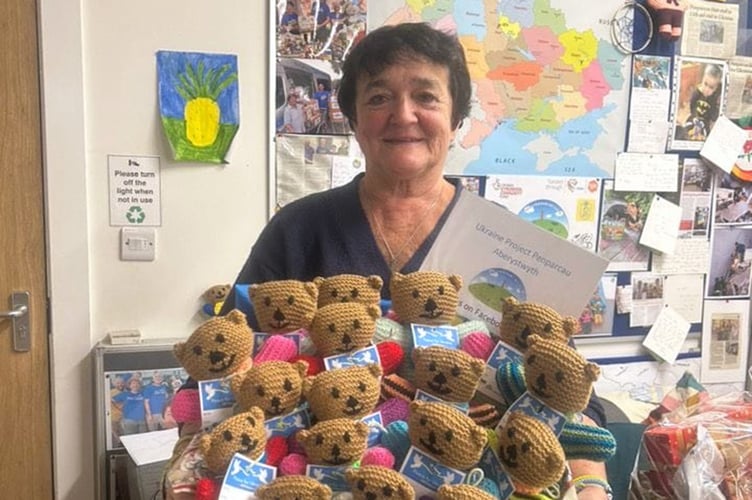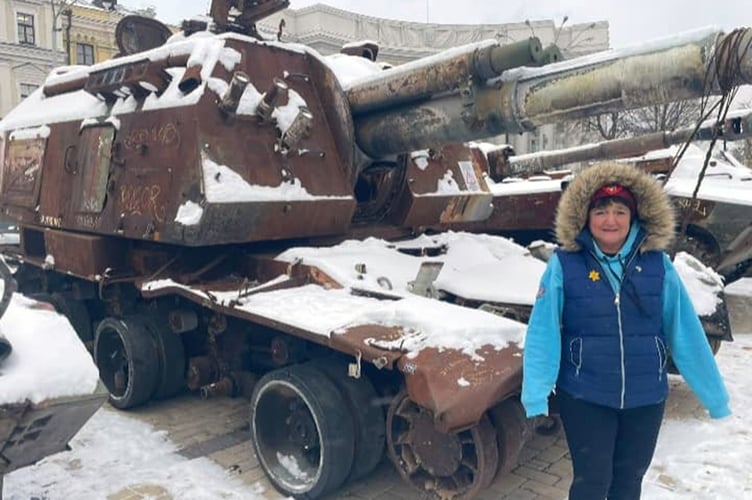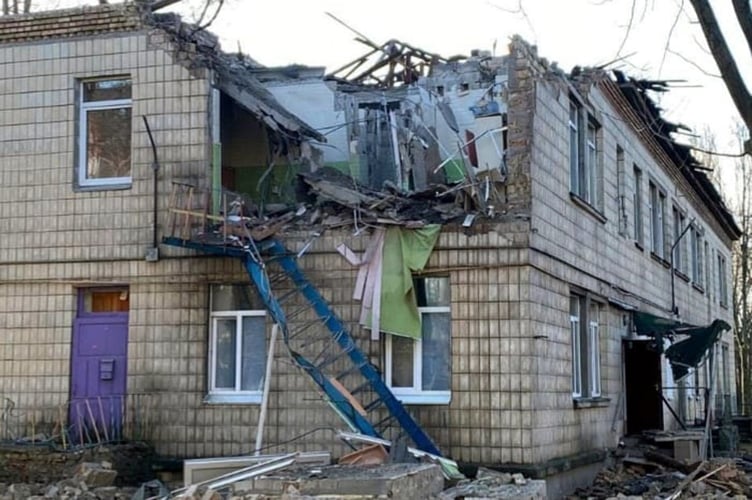A retired police officer from Aberystwyth who has spent nearly six weeks in Ukraine has shared her story as part of an appeal for donations – including used vape pens, which Ukrainians are using as battery packs.
Jenny Jenkins, who works at the Penparcau Hub, spent five and a half weeks in Ukraine over the course of last year.
During that time, the 64-year-old has seen ‘absolutely heartbreaking’ scenes as well as ‘incredible resourcefulness’ and strength from people who are making do with nothing.
From refugee camps, people working in half burned down buildings, hospitals struggling to keep the lights on, and missing an airstrike where she was staying by less than a day – Jenny has seen the impact of the Ukraine war from many angles, not least of which from the perspective of the ‘resilient’ everyday people.
She has seen the war in a way that statistics and the latest news from the frontline of the war can’t capture.
While helping out at the Penparcau Hub on one of its warm space and hot meal events, she spoke to the Cambrian News about the multitude of scenes she saw during her time in Ukraine.

She said: “I’ve been involved in the Ukraine war since day one. I’ve been driving trucks and aid over there. I spent time there during the summer and last November, about five and a half weeks altogether.
“I’ve always been active and had a desire to help people. Going there, it was a no-brainer really.
“At the end of the day it’s a very sad, frightening and dangerous place, but someone has to help. It was scary and I cried a lot during my time there.
“During my time there in the summer, we left Kyiv one morning, and it was attacked that night. No one knew that attack was coming, and that’s the real sadness about it all. They didn’t think they were going to be attacked even at midnight that night, it will have gone down to the wire.”
The possibility that she could have been one of the many people injured in that strike didn’t hit Jenny until she’d left the country.
But she still had more help to give and she was determined to stick to her mission.
“Knowing that we’d missed the attack by so little, it was a strange feeling. Of course I was immensely sad, but something must have been looking out for me. It wasn’t my time to go.
“It’s strange though, these thoughts didn’t cross my mind until I’d left Ukraine. When you’re there you don’t think about it like that, you block it out. It was only after that it really sank in. When you’re there you think ‘I’m here to help, I’ve got to help, so that’s what I am doing.’ You focus on that.
“But people died. When I saw the horrendous video of the attack and its aftermath – people falling over each other trying to escape across a bridge. Bodies were being wheeled out, they were covered, but you could see little legs hanging out. They were children. Their mums and dads dead alongside them. They were hit by rockets again only two days later. When I got back to my children, I just held them so tightly.”
Jenny had some first-hand experience of the chaos that unfolds when an airstrike is likely, as air raid sirens blast out across the area.
Though she was desperate to get to safety, the first time she heard the siren, it stopped her dead in her tracks.
“The warning sirens go off all the time, I remember the first time I heard it my legs froze. It wasn’t an experience I’d ever had, so to actually hear it you think ‘Oh God, what do I do?’ My body was moving, but my legs were frozen stiff. But the Ukrainian people live like that 24/7.”
But this happened during the summer, before another enemy would show its face, the winter, and the ‘freezing’ cold.

“When I went over in November, we were taking Christmas presents over. We’d done the same in 2022, and at the time, I didn’t think we’d be coming back to do it again in 2023. The first time, we drove them to the Ukraine border, but this time we went into Ukraine itself and delivered the presents to various areas. One place we went to was a refugee camp in Borodyanka, an area that was heavily hit at the beginning of the war.
“It was heartbreaking, families, children and everyone were living piled on top of each other in shipping containers. The weather was freezing, it was snowing and the roads were treacherous anyway because they had been damaged and it was difficult for infrastructure to be repaired. All the men under 60 were fighting to defend their country.
“We got there very late at night and even the children were withdrawn. They didn’t understand what we were about. We put on our Santa hats and showed the presents and it didn’t take long to realise we were friends. It was unbelievably humbling. It does bring me to tears. The whole situation, it’s so heartbreaking.
“Being there opened my eyes to how important everyday things are. I’ve always thought I’m quite good at saving things and not being wasteful, but I’ve left the tap on too long sometimes; water is such a precious item there that you can’t. You take for granted so many things living here; we think we’ve got it bad, but it’s another world there.
“They wouldn’t always have running water so you had no guarantee you could even flush the toilet or get a glass of water on any given day. They wouldn’t always have electricity either. The impact of that could be profound, especially on hospitals, where the power could go in the middle of an operation. Can you imagine that? You’re halfway through an operation and you suddenly lose all power.
“On top of that, their infrastructure is being bombed all the time. Their houses and residential blocks are hit, their factories and hospitals have been hit. Even their schools. Why they would bomb a school, I don’t know.
“One night we stopped at a gas station, it was dark, but as we looked at it we thought ‘something’s not right here’. Part of it had been boarded up and it looked like some parts of the building were missing or had disappeared, like it had been hit by a landslide. It had just gone. There was a metal frame in the doorway, great chunks had been taken out of it.
“We went inside and spoke to a girl working behind the counter who couldn’t have been older than 20. We asked if the building had been attacked and it had. She told us there was a fire and soldiers had been shooting in through the door. She was there when it happened and saw the whole thing unfold. It doesn’t feel real; here she was working out of a half burned down garage. It felt like a dream ,you ask yourself, ‘am I going to wake up from this?’”

Many everyday items that we may not think twice about throwing out here, were crucial, and even ‘life saving’ out there. Jenny and the Penparcau Ukraine Appeal donated generators and she had the opportunity to visit a hospital using one of these donated generators.
“We donated 23 generators; one of them cost £5,000 and was used in a hospital. I had the opportunity to visit the hospital while I was out there, seeing the generator standing proudly in the hospital courtyard providing power, especially to its theatre, it was so humbling. It saved lives.”
But the value of everyday items goes much further in the hands of the ‘resourceful’ Ukrainian people.
“The Ukrainians can make something out of nothing. One thing which you can see in a lot of pictures coming out of the country, is that they make tins out of metal, like a tin of peas or beans, which act as heaters and hand/feet warmers. They put brown cardboard paper in the tins, melt wax inside and put a wick in the middle. They have these big containers which heat up the wax and they ship them out across the country to places where there is no electricity. They can be used for heating or to boil water.
“They also make little food packs, which can be cooked just by boiling water. They send them to care homes and villagers where there is no electricity.
“Soldiers in the trenches can use the handmade heaters for their feet as well. The trenches get cold and wet and many soldiers there are losing their toes suffering from trench foot. I’ve seen pictures of their toes turning completely black, and doctors here have said, there’s no chance they wouldn’t lose them, even saying they needed to be amputated.”
Even e-cigarettes and empty vape pens, in the hands of the Ukrainian people, can be turned into battery packs, powering equipment on the frontline, bringing light, electricity, and heating to the everyday people facing airstrikes in the major towns and cities and to the people stacked together in shipping container refugee camps.
“A contact I have down there has asked for collections of e-cigarettes and vape pens. They make battery packs out of them. They’re especially useful for the soldiers who need to control and power up a range of electronic equipment defending from drones.
“I’m doing this through the Penparcau Ukraine Appeal, so you can drop them off with me at the Penparcau Hub.”
Sought-after donations
• Vape pens and e-cigarettes
• Generators
• Medical items such as bandages, cough medicine, painkillers and Ibuprofen
• Nappies and baby food
• Wool or walking socks
• Hiking boots
• Hand warmers
• Animal/Pet food
Despite the efforts of people like Jenny, there are many in Ukraine who are suffering even more than they are from the war alone, because of shortages of everyday items.
“People out there are dying of hunger, some places hadn’t seen food for months. Things you wouldn’t even think about: incontinence pads and colonoscopy bags. They were reusing the pads where they could and had resorted to using pet pads where they needed to.
“I spoke to one woman who was dying from terminal cancer. She needed a colonoscopy bag everyday or she wouldn’t be able to get out of bed. But the doctors were telling me that they didn’t always have bags. Can you imagine that, despite everything going on around you, and inside of you, being forced to lie in your bed all day because you have no colonoscopy bags? It’s mind-blowing.
“It’s so incomprehensible, especially in Europe. We are supposed to have had the war to end all wars. But this is a European country. What people don’t understand is if Ukraine loses, the war won’t stop there. They’ll go to Poland or further into Europe next. If I could go to parliament and tell everyone there what is going on in Ukraine, I would. The whole situation is disgusting.
“I am proud of what we as a country have done to help, just recently we signed a £2.6 billion aid deal to send money to Ukraine. Hopefully other European countries will do the same, because they’re human beings, they’re our brothers and sisters. They’re Europeans as well.”
Jenny and Penparcau Hub Ukraine Appeal are always accepting a variety of donations, the team there works to ensure each item is delivered to Ukraine. Jenny also has contacts out there who she can send money to to make sure all of it goes to the people who need it.
You can contact Jenny through Facebook if you would like to donate money.


